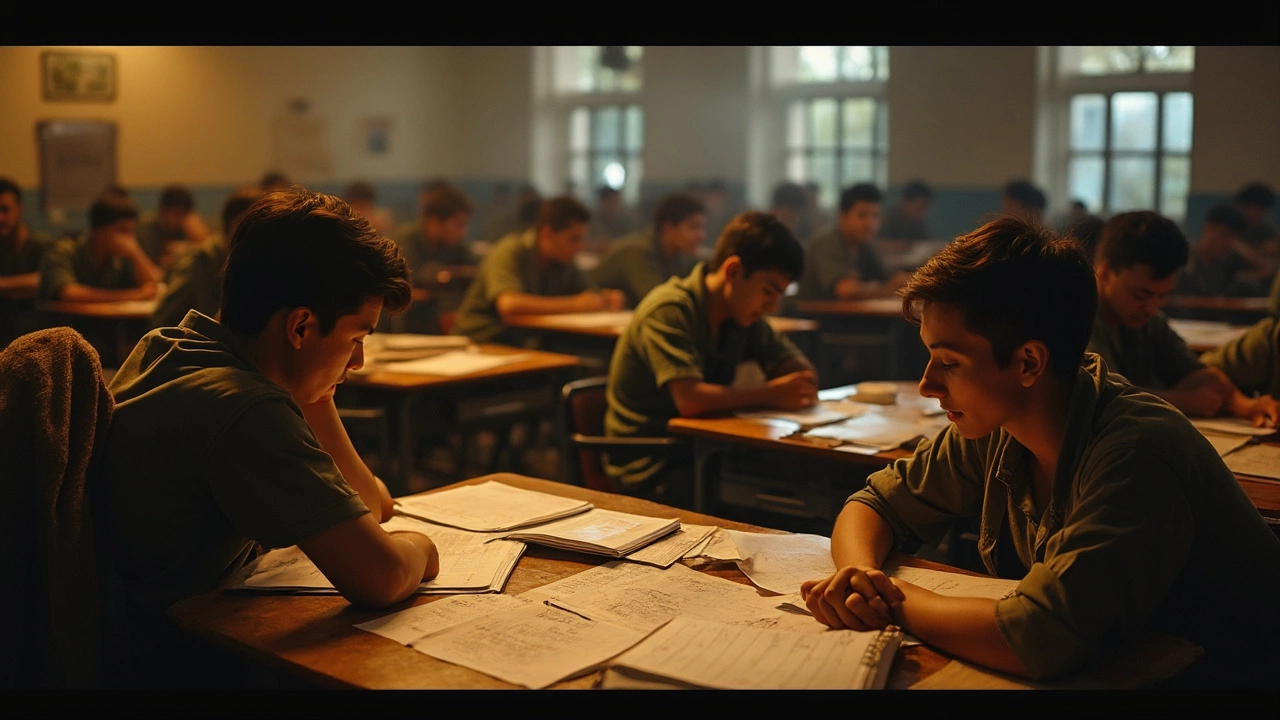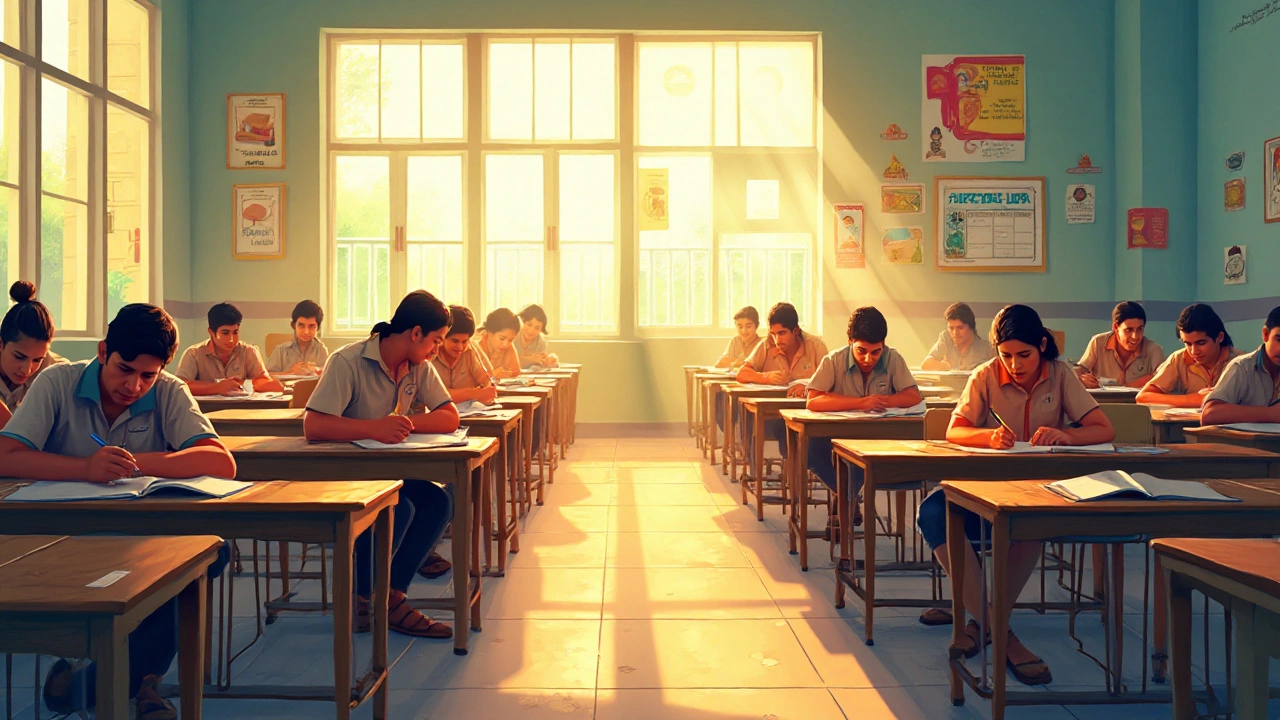If you've spent any time around JEE aspirants, you already know the dreaded question: Which was the toughest JEE Advanced paper? Everyone’s got their own horror story. But what actually makes a JEE paper brutal? It isn’t just the mind-bending questions—it’s how the paper flips your expectations and pulls you out of your comfort zone.
One year the Physics section avoids the usual tricks and goes wild with experimental setups. Another time, Chemistry throws in a mess of organic reactions nobody prepared for. The truth is, every “legendary” tough paper leaves its mark on a whole generation of students—and reshapes how the next batch of hopefuls gets ready for battle.
If you’re prepping for JEE, knowing what made those legendary papers so hard isn’t just interesting gossip. It helps you dodge common traps and see where your own preparation could crack. Ready to learn directly from the toughest years? Let’s break down what really happened—and what you can steal for your own prep strategy.
- What Makes a JEE Advanced Paper 'Tough'?
- Years That Took Students by Surprise
- Stories from the Warzone: Real Experiences
- How to Tackle Unpredictable Exams
- Learning from the Toughest Papers
What Makes a JEE Advanced Paper 'Tough'?
Ask anyone who's been through JEE Advanced and they'll tell you, it's a different beast every year. But what exactly makes people label certain papers as the “toughest”? It’s not just hard questions—lots of exams throw tough questions. With JEE Advanced, there are layers to the challenge.
First up, unpredictability is the paper’s biggest weapon. The exam setters like to ditch direct theory and throw real-world application-based or multi-concept problems your way. You might expect an organic chemistry question about common reactions, but suddenly it’s a crazy mix involving physics logic and tricky data interpretation. These are what veterans call “integration” questions—they demand you connect dots from different chapters, sometimes even across subjects.
Another factor: moving beyond known formats. Some years, JEE Advanced throws everyone for a loop with new question types. Remember 2016 when the exam had more match-the-column and comprehension questions than lectures or coaching predicted? Or 2015 when numerical value questions started appearing? These changes force everyone to adapt on the spot, which rattles even well-prepped students.
Here’s the real kicker—marking schemes. Anyone who sat for the infamous 2018 paper will never forget the mix of partial and negative marking, especially when attached to multiple correct options. You can lose marks even when you’re partly right, which cranks up the pressure.
- Tough concepts: Deep dives into rarely touched portions of the syllabus, like rotational dynamics or tricky P-block chemistry.
- Time pressure: Even those who know their stuff trip over lengthy calculations or lengthy reasoning chains. The clock becomes your enemy.
- Psyche games: A section that looks “easy” at first glance but hides double-meaning or misleading instructions—a favorite move of examiners. You think you’ve got it, but then realize halfway through that you’ve been baited.
Look at this table for a quick snapshot of elements that made certain JEE Advanced papers stick out over the last decade:
| Year | Why It Was Tough |
|---|---|
| 2016 | Heavy on novel question types, more multi-concept questions |
| 2018 | Twisted marking scheme, mix of tough Physics and Chemistry questions |
| 2015 | First time with numerical value answers, caught many off-guard |
| 2022 | Unusually lengthy Physics section, time crunch for most |
If you really want to judge a paper’s toughness, it's not the scary formula or rare trivia. It’s how the paper scraps your comfort zones and asks you to think on your feet. Keep this in mind as you dig into past papers or prep for your next big attempt.
Years That Took Students by Surprise
When people talk about the toughest JEE Advanced papers, a few specific years always come up. The 2016, 2018, and 2022 papers are practically legends for how they caught everyone off-guard. These papers totally broke the usual patterns students thought they could rely on.
Take 2016, for example. Most students walked in thinking Physics would be the usual speed-and-accuracy game, but the section turned into a puzzle fest. There were multi-step problems where one silly mistake cost you five marks. Plus, the negative marking that year was savage—one wrong answer could tank your score fast.
| Year | Subject | Notorious Feature |
|---|---|---|
| 2016 | Physics | Multi-step puzzles, harsh negative marking |
| 2018 | Mathematics | Completely unpredictable, ambiguous MCQs |
| 2022 | Chemistry | Heavy on memory-based and rare reactions |
2018 hit the hardest for Math lovers. The section had weird question types—match the columns, more than one correct, and questions with barely any straightforward calculation. It tripped up even rankers. There was a ton of discussion around the odd marking scheme and questions that seemed to have more than one possible answer on first glance.
In 2022, Chemistry wore the troublemaker crown. Instead of the usual balance of physical, organic, and inorganic, the paper leaned into rare organic reactions and some seriously out-of-the-box memory-based questions. Students who had focused only on last year’s trends or just standard mock tests felt betrayed.
- Surprise elements are a classic JEE weapon—trusting ‘safe bets’ is risky.
- Each tough year, cut-off scores dipped, and coaching institutes scrambled to explain the new curve.
- The pattern: whenever too many toppers start predicting the exam, the next year’s paper shakes everything up.
These years prove that JEE Advanced is less about grinding out past papers, and more about prepping for surprises. Those who kept calm, moved on from tricky questions fast, and had flexible strategies did way better than the ones who froze when their expected ‘favourite’ section changed character overnight.

Stories from the Warzone: Real Experiences
You've probably heard tales about specific years when the JEE Advanced turned brutal. The stories aren’t just for scaring juniors—they're packed with lessons. 2016, for example, instantly comes up in every heated discussion about the toughest paper. That year’s Paper 2 was a nightmare, especially the Physics section. Questions included concepts that most mock tests never touched, and the marking scheme had negative marks even for some numerical problems. A lot of toppers scored way below their regular practice averages that day.
Or take 2015, when the Mathematics section left many in tears. Even some future IITians sat stunned by the sheer number of multi-step problems. One student, now at IIT Bombay, said his whole strategy fell apart when he realized the usual "easy picks" were nowhere to be found. The trickiest part? Time management blew up, with many barely attempting half the paper because they were stuck on long Calculus and tricky Coordinate Geometry sets.
Candidates who faced the 2018 paper remember Chemistry turning into a memory test. Instead of relying on logic or reasoning, the paper demanded recall of obscure exceptions and rarely-asked reaction mechanisms. Here’s what stands out: according to coaching centers, the average Chemistry score that year dropped by almost 25%, showing just how tough it got.
Just for perspective, look at these numbers:
| Year | Average Physics Score | Average Chemistry Score | Average Maths Score |
|---|---|---|---|
| 2015 | 45 | 51 | 36 |
| 2016 | 38 | 49 | 47 |
| 2018 | 44 | 39 | 41 |
Another jaw-dropping story: In 2012, students struggled with the newly introduced matrix-matching questions. One guy said he lost 30 minutes just on two questions because he was convinced he missed a "hidden trick"—but there wasn’t one. Sometimes it’s about changing patterns, not increased complexity.
If you talk to previous rankers, almost all say the same thing: the JEE Advanced messes with you by breaking routine and messing up your comfort. No matter how ready you are for a "difficult" question, unpredictable format changes or confusing marking schemes are what hit hardest. Keeping your cool and bouncing back after a tricky section often matters way more than how many formulas you’ve memorized.
How to Tackle Unpredictable Exams
If you want to survive when the JEE Advanced throws you a curveball, it's not just about hard work—it's about staying smart and flexible. The difference between cracking a tough paper and getting stuck usually comes down to your approach on exam day and the habits you build while preparing.
Let’s break down what actually helps when the questions go way off the usual script:
- Master Concepts, Not Just Tricks: Honestly, memorizing shortcuts might help in easy years, but when the paper is weird, real understanding wins. If you know the basics inside out—think fundamental laws in Physics, real Chemistry mechanisms, and core Math principles—you’ll find your way, even with twisted questions.
- Practice Thinking on Your Feet: Don’t just stick to last year’s papers or regular question banks. Mix in unusual or Olympiad-level problems. Some of the toughest JEE Advanced years had sections nobody saw coming—like the infamous 2016 Math Paper 2 with confusing matrix questions.
- Don’t Panic—Prioritize: Sometimes, the whole paper won’t be tough—just parts of it. Take 90 seconds at the start to scan every section. Flag easy marks first, then circle back. Toppers in 2015 said they skipped the scary organic section first, grabbed solids and physical chemistry, and came back later.
- Time Management is Survival: On average, students lose 15-20 marks in tough papers just because they freeze on a single puzzle. If you catch yourself stuck for more than a couple of minutes, move on. Set micro-deadlines for each section.
- Mock Tests Under Pressure: Simulate exam chaos. Give yourself mock tests with unbalanced sections, strict timing, and sometimes, questions you’ve never seen. This trains your brain for the real mess. According to a 2023 survey by Resonance, nearly 60% of high scorers said doing at least 12 full-length unpredictable mocks made them comfortable with whatever came their way.
Check out this quick comparison from recent years:
| Year | Main Challenge | Common Reaction |
|---|---|---|
| 2016 | Math Paper 2: Tricky matrix and algebra questions | Panic, skipping tricky sections helped |
| 2015 | Chemistry: Heavy on organic, less usual patterns | Selective attempt, focused on strong zones |
| 2020 | Physics: New experimental setups, unexpected concepts | Best performance from students who understood fundamentals |
So here’s the deal: Tough JEE Advanced papers reward those who stay calm, know their basics, and know when to move on. If you focus on understanding, practice weird problems, and treat each mock like you’re in the real thing, unpredictability won’t scare you anymore.

Learning from the Toughest Papers
If you look at the infamous JEE Advanced exams from past years, the biggest lesson is this: toughness isn’t always about crazy-difficult questions. Sometimes, it’s pure unpredictability. For example, the 2016 paper packed surprising twists with multiple-correct options and complex paragraph-based questions. Students and even some teachers were caught off guard because they hadn’t seen formats like these in many years.
Let’s get practical. What can you actually take away from these monster years?
- Don’t Get Stuck on a Pattern: The 2015 and 2018 Chemistry sections tossed the usual formulas out the window. If all your practice is based on trends from previous years, it’s a risk. Make sure to practice diverse question types.
- Time Management Is King: One of the top scorers from the 2019 exam said he nearly panicked in the second paper because the math was much trickier than expected. He bailed himself out by moving to easier questions first—basic but a total lifesaver.
- Mock Tests Need to Be Brutal—On Purpose: Try making your own toughest paper or find the ‘nightmare’ mock tests online. If you can survive those, the real thing will feel less scary, no matter which year’s style shows up.
- Don’t Ignore the Odd Topics: In the toughest JEE Advanced years, questions sometimes popped up from weird subtopics—like rotational dynamics in extreme detail, or rare organic reagents. Cover your bases.
It’s easy to get lost in stats, but sometimes the numbers hit hard. Here’s one look at how many students found key papers tough (based on exam analysis from coaching institutes):
| Year | Perc. rated "Very Difficult" | Standout Paper |
|---|---|---|
| 2016 | 54% | Paper 2, Physics |
| 2015 | 48% | Chemistry (both papers) |
| 2018 | 51% | Math (Paper 1) |
So, what’s the bottom line? The toughest JEE Advanced paper will always throw a curveball. The winners are usually the ones who stay calm, manage their time, and train for chaos—not just for routine drills. If your prep covers surprises, you’ll always have the upper hand, no matter which year’s paper lands in front of you.


